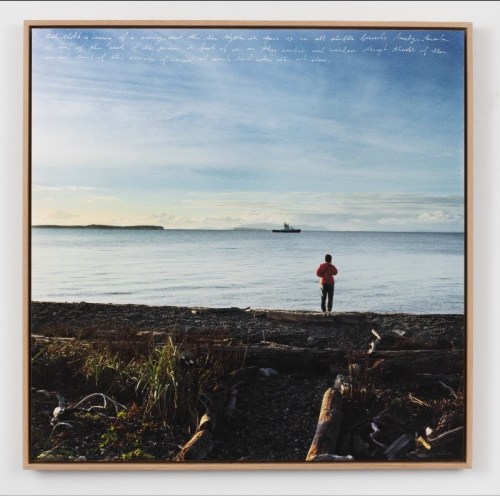Sky Hopinka: Unforgiven Souls Sing Hymns
June 27– August 2/24
6/21/24
Back
Sky Hopinka: Unforgiven Souls Sing Hymns
June 27– August 2, 2024
Opening Reception Thursday, June 27 6– 8 pm
373 Broadway
New York, NY
Tues-Sat 10am-6pm
Where we thought we’d lay we lie no more.
When we thought we’d rest instead we’re hurried
towards an end that is damned and damning.
Unforgiven souls sing hymns without worry
of sacrament and sin.
Your worry is not our own.
Your worry erodes pressures pressed by hands arthritic and aching,
stiff and alone.
You are the prayer and the passenger met when ghost songs summon you.
— Sky Hopinka, Denizens of Hell
Broadway Gallery is pleased to present Unforgiven Souls Sing Hymns, a solo exhibition of new monumental photographs and a two-channel video installation by New York-based artist Sky Hopinka. The exhibition will be on view June 27– August 2. Join us for an opening reception on Thursday, June 27 from 6 to 8 pm. On Thursday, July 18 at 6 pm, Hopinka will read from Denizens of Hell, his new chapbook published by Inpatient Press on the occasion of Unforgiven Souls Sing Hymns.
Sky Hopinka (Ho-Chunk Nation/Pechanga Band of Luiseño Indians) works in video, photography, and text to explore personal positions of Indigenous homeland and landscape. Engaging with notions of place by asking who lives here now and who lived here before, Hopinka explores what it means to be a guest and at home through various registers of belonging. An avid student and teacher of chinuk wawa and Ho-Chunk, Hopinka’s work utilizes how language and poetics operate as a container for culture.
Consistent across Hopinka’s oeuvre is the use of poetry as a nexus for producing his films and photographs. Here, Denizens of Hell, a new poem written for this body of work, anchors the pieces on view. The book is a series of texts produced on Hopinka’s travels throughout the west, to powwows, diners, and dining room tables accompanied by Passenger Ghost, the narrator's incorporeal companion. In a new two-channel video, Subterranean Moon, verses from this poem permeate scenes from a powwow outside of Seattle, organized by the artist for his upcoming feature film, Powwow People. Subterranean Moon is deftly emceed by Ruben Little Head, guiding the viewer and the audience through a 30 minute long take of a Northern Traditional dance special. The footage in the second channel is abstracted by one of Hopinka’s signature treatments, a formalistic technique in dialogue with ethnopoetic documentation and representation he’s employed throughout his work. For Hopinka, the confluence of the poetic verse and the movement of his embodied camera is a vehicle for relating to and listening to the beings and ancestors who haven't been repatriated by museums and institutions, all the while questioning different forms of confinement that they must contend with.
Since Hopinka began his photography practice in 2018 as an extension of his filmmaking, he’s used the quick snap of the camera lens as a mnemonic activation while traveling. The photographs on view in Unforgiven Souls Sing Hymns traverse forests and coastlines found west of the continental divide and the northern regions of the Pacific Northwest, where Hopinka was raised. A sense of movement is also at play in these works, a new series of diptychs and triptychs—sculptural in orientation and his largest to date—play with horizon lines and the reorientation of locale. Formally, Hopinka inscribes letters and verses from his Denizens of Helldirectly onto the photograph, etching texts and symbols directly onto its surface. In this way, he references practices of inscription found in native ledger art created at the turn of the nineteenth century by inverting its formal traditions as a visual document.
Unforgiven Souls Sing Hymns demonstrates Hopinka's sophisticated keen sense of scale and breadth; not just formally, but in his historical consideration. The photographs and two-channel film signal a return as well, resituating and revising the artist’s ongoing pursuit of the ethnopoetic that’s long been present. Poetically, Denizens of Hell offers a narrative linchpin across the exhibition, weaving together a subterranean sleepwalk through ways of survival and the resistance to the inculcation of dogmatic culture and beliefs.